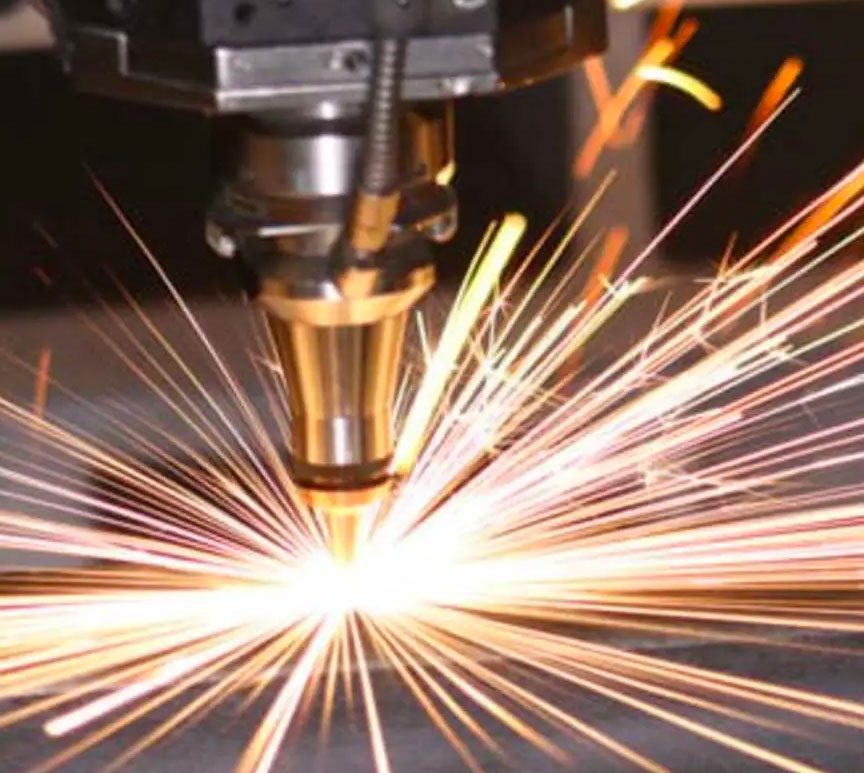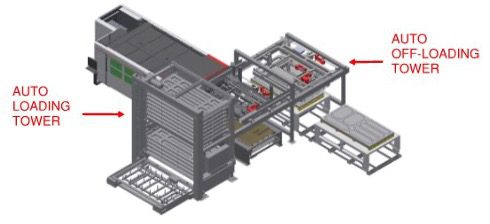
| Updated March 19, 2024Laser cutting sheet and plate metal has become so incredibly fast in recent years that new laser cutting machines can cut faster than humans can on-load and off-load materials.
One might make the comparison of racing a Ferrari across the Utah desert headed for lucky Las Vegas.
Typically speaking from experience, a normal Salt Lake City to Las Vegas trip is about six hours.
 Introduce a Ferrari and the ability to travel at one hundred and sixty miles per hour (assuming no highway patrolmen) and the trip should only take three hours.
Introduce a Ferrari and the ability to travel at one hundred and sixty miles per hour (assuming no highway patrolmen) and the trip should only take three hours.
Three hours, of course, will not happen, as we all intuitively understand. Add to the trip the normal road construction, traffic congestion and bathroom breaks, and you immediately understand that no matter how fast your car can travel—you are stuck with six hours.
The point is overly simple but intentional. Fast laser cutting technology is not that impressive unless moving the metal on and off the machine is just as fast—clearing the road so-to-speak! (like driving at 2:00 AM)!
Frankly, without automation, this is impossible.
Short answer: it really does get you to Vegas in three hours.
Customers really benefit from this increased productivity in three ways: shorter lead times, more competitive pricing and on time delivery!
Frankly speaking, automation can move materials, parts and pieces up to five times faster than traditional laser cutting with no automation.
Job shops often shy away from automation for a few reasons. One, they do not understand the bottleneck principle. That sounds a little absurd but, in truth, it is quite true. People are always captivated by power and speed. Who wouldn’t want a Ferrari, right? The look and feel of the car, the sound of the roaring engine, the speed, the insanity of the car is overwhelming and, deep down, we all know that we would love one of those bad boys.
Job shops often purchase power because they simply want to have the biggest, baddest laser on the market. There is also the fear of being out done by somebody else, especially a nearby competitor. It has sort of led to the laser-cutting cold war. If my competitor has a monster-cutting laser, I better get one too.
Another reason is that job shops, naturally, have limited investment opportunities. Unlike enormous OEMs that drop money on equipment like family birthday presents, smaller-sized job shops which commonly serve a wide variety of customers, must count their capital investment money closely. The question of spending money on automation must be weighed when comparing it to other capitol investments. Everything is expensive.
Automation is newer and somewhat risky—what if the ROI is less than expected? What if it doesn’t really work? It is not time tested in job shop environments and questions remain about how it will work doing low-volume, high-mix parts, which is traditionally what job shops do.
Similar to investment dollars are questions about the investment space. Automation takes valuable square-foot floor space that, again, might be better used on other pieces of fabrication equipment or even inventory space. All the same arguments apply as noted above. Is this really the right decision? Should I be using the space for different types of work centers? Job shop owners ask those questions repeatedly.
Whether it is not understanding the theory of constraints (bottlenecks) or worrying about capital/floor space investment, or any other reason not listed, the fact remains that few job shops have incorporated automation when it comes to flat sheet laser cutting.
AMF, on the other hand, has made a commitment to this niche, understanding that markets are extremely competitive and that success requires very targeted strategies—we must know both who are customer are and what our customers want.
Our goal is to lead the industry in flat sheet laser cutting efficiency. We are committed to that goal and are putting time, money and space toward setting ourselves apart from the competition.
Unlike a traditional job shop production, automation, obviously, has been an enormous part of high-volume, low-mix manufacturing. We are all familiar with videos from large automotive manufacturers. Watching the assembly-line welding, for example, is mesmerizing. Car after car paces down the assembly line with robotic arms dancing between flying sparks as each car is welded and assembled. It is amazing to watch.
Although happening methodically, those advances are starting to grab hold in low-mix job shops as well. Certainly, job shops cannot reach high volume automation, but we are gaining ground on low-mix items and flat sheet laser cutting is certainly one of those areas where this has become a reality.
Metal sheets are now stacked on enormous automated shelving where they lie in wait for their cutting sequence. The automation is smart enough to stack and ready the metal while the laser machine is busily cutting the sheet under the hood.
Finished parts are shuttled off in a different direction while new, blank sheets are being loaded. The instant the machine is done, rather than waiting for human hands to unload the parts, and slowly waiting for another human to load the new raw metal sheet, it does these tasks automatically and very quickly.
The process even allows for the laser to run unattended.
Again, all these features are amazing, but where it really counts is how it benefits our customers. These benefits, namely shorter lead times, more competitive pricing and hitting due dates are critical and, ultimately, the aim for all this work and investment.
As always, we invite you to learn more on our website, www.allmetalsfab.com or via email, info@allmetalsfab.com.
AMF was founded in 1994 and our goal, from the very beginning, is to be a world-class provider and recognized leader in metal, job shop, fabrication.